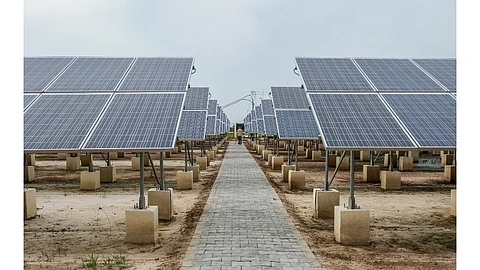

RE tender cancellations in India: Shripad Yesso Naik, the Minister of State for New and Renewable Energy and Power, has said that the state-owned Renewable Energy Implementing Agencies (REIA) have had to cancel 11.4 GW of renewable energy procurement tenders as of June 30, 2025. These tenders were issued by the Solar Energy Corporation of India (SECI), NTPC Limited, NHPC Limited, and SJVN Limited since April 1, 2023. Answering questions in Rajya Sabha, the Lower House of the Indian Parliament, Naik shared that the reasons for cancellations are varied, and include insufficient participation, unreasonably high tariffs discovered, and the targeted end producer backing out, among others. He also informed that these REIAs have issued letters of award (LOA) for 43.92 GW renewable energy capacity, but power sales agreements (PSA) with end-procurers have not been signed as yet. He attributed this to a significant quantity of renewable power bid out in the recent past. The REIAs have signed PSAs of 22.7 GW capacity since April 2023.
To discourage the misalignment in bid issuance, transmission readiness and demand from end-procurers, bidding guidelines were amended earlier this year to allow LOA cancellation if a PSA isn't signed within 12 months.
1 GW RE in Bihar: Avaada Group has signed a memorandum of understanding (MoU) with the Bihar Renewable Energy Development Agency (BREDA) to develop 1 GW of renewable energy projects in the state. It will entail an investment worth INR 50 billion ($569 million). The plan is solar-heavy as the planned projects comprise ground-mounted, floating solar, community solar plants, and battery storage projects, among others. It is in line with the state’s Renewable Energy Policy 2025 under which Bihar targets 23.9 GW of renewable and 6.1 GWh of storage by FY 2029-30 (see India Solar PV News Snippets: Bihar Targets Over 23 GW RE Capacity Under New Policy & More). On its part, the state government will facilitate the company in obtaining necessary approvals and clearances. Avaada expects this investment to create 500 direct jobs. Production is likely to commence within 2 years after the power purchase agreements (PPA) are executed with state agencies. The company also expects to benefit from any state incentives available.
Bluebird Solar is expanding: Greater Noida-based solar module manufacturer Bluebird Solar has announced that it is expanding its manufacturing capacity. The company plans to scale up from 1.2 GW to 2.5 GW annually at its existing factory in Greater Noida. The expansion, explained Bluebird Solar, is part of its strategic growth roadmap to meet rising demand driven by government schemes such as PM Surya Ghar: Muft Bijali Yojana, and PM-KUSUM. The fully automated manufacturing lines to be added under the expansion will be fully operational by October 2025.
ALMM clarifications: The Ministry of New and Renewable Energy (MNRE) has specified that government solar projects that are required to use solar PV modules from the Approved List of Models and Manufacturers (ALMM) List-I will be exempted from complying with using solar cells from ALMM List-II. This will be allowed only if the project’s bid submission deadline falls on or before the cut-off date, which is defined as one month after the publication of ALMM List-II for solar PV cells, currently scheduled for June 1, 2026. This exemption applies only to solar PV cells, not to modules. Additionally, there will be no relaxation in Domestic Content Requirement (DCR) provisions under MNRE schemes such as PM-KUSUM (Components B and C), PM Surya Ghar: Muft Bijli Yojana, and CPSU Scheme Phase-II.
The ministry also clarified that solar plants installed by private enterprises to charge a battery energy storage system (BESS) will not be exempt from the ALMM requirement if the system supplies power (directly or indirectly) to the grid. Such plants are not considered behind-the-meter projects solely for captive use.
